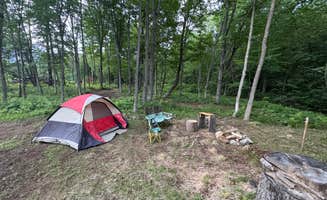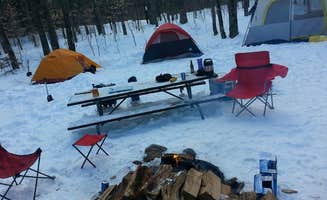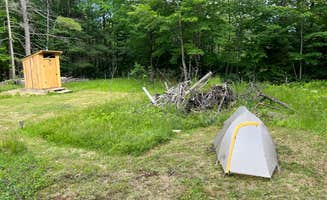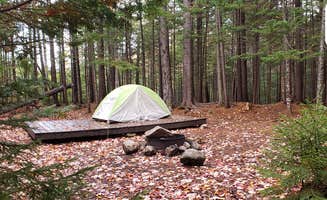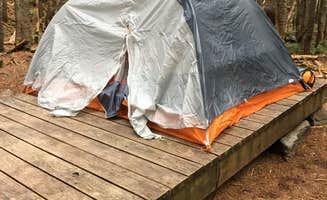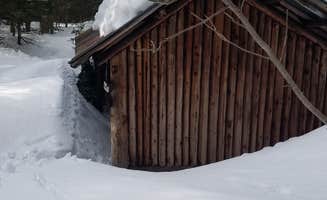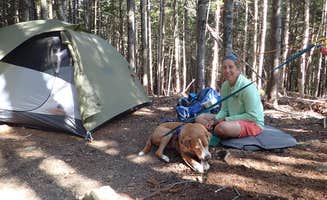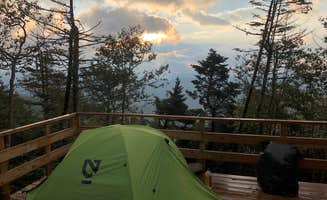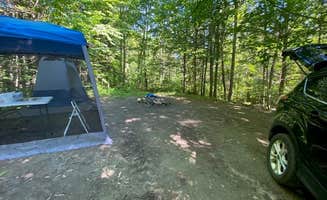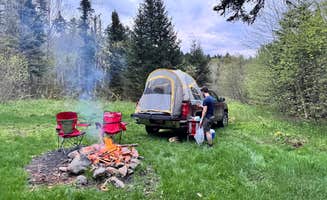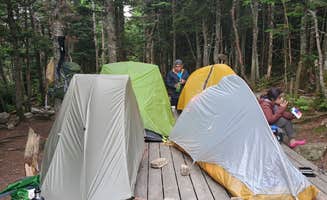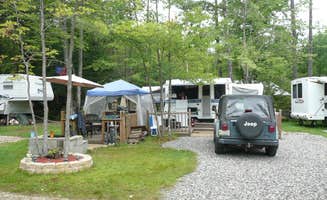Backcountry tent camping options near North Conway, New Hampshire range from 1.5-mile hikes to more challenging multi-mile treks into the White Mountain wilderness. Most primitive sites are situated at elevations between 1,200 and 4,300 feet, with seasonal accessibility affected by snow conditions from late October through May. Water sources typically require treatment, and bear activity remains consistent throughout the warmer months.
What to do
Waterfall hiking: Access multiple cascade trails from Fourth Iron Campground. "Near some short waterfall hikes" notes Mike M., while Sarah C. adds that there's "a nice spur trail to a water fall to explore on the hike up or down" from Ethan Pond Shelter.
Alpine summit attempts: Use backcountry sites as base camps for mountain climbs. At Guyot Shelter, "We got to the site, claimed our platform and hiked over to West Bond to catch a beautiful sunset," shares Hollie G., who recommends the wooden platforms at 4,360 feet elevation.
Fishing opportunities: Some backcountry ponds offer angling options. Jean C. mentions "I've ice-fished on the pond" at Sawyer Pond, which maintains accessibility even during winter months with proper equipment and preparation.
Cold-water swimming: River sites provide refreshing dips during summer heat. "The water is clear and cold, refreshing on a warm day," notes Sarah C. about the multiple rocky beaches at Fourth Iron Campground along the Saco River.
What campers like
Beginner-friendly backcountry: Several sites require minimal hiking and serve as introduction to wilderness camping. "This is a great beginner backpacking trip, great even for kids!" writes Jen O. about Nauman Tentsite, describing a "nice 2.7 mile hike in from the AMC highland center."
Clear night skies: Remote locations offer exceptional star-viewing opportunities. Erin H. explains about Sawyer Pond: "The pond is gorgeous and the stars were AMAZING. You do have to forage for firewood, which can be rough, but there's a fire pit right in front of the lean to. I've never seen stars like I did here."
Shelter options: Many backcountry sites offer both tent platforms and three-sided structures. "There are 6 sites, 2 toilets, and 1 lean-to. There is a platform to pitch a tent (or 2) on and a fire pit with a grill attachment at each campsite," reports Hunter P. about Sawyer Pond.
Water sources: Most backcountry sites include reliable springs or streams. At Guyot Shelter, Jerome S. notes "Great Water source right near the eating area," making it convenient for treatment and cooking purposes despite the remote location.
What you should know
Limited availability: Popular backcountry sites fill quickly during peak seasons. Sarah C. warns about Sawyer Pond: "Due to the site's popularity, plan accordingly. Have a back-up plan for an alternate camping location. We witnessed several parties, many with young children, arriving late to find that all the sites were occupied."
Bear management required: Food storage protocols are strictly enforced. "There is one bear hang located just in front of sites 3 and 4 that is large enough to accommodate food from multiple groups. You will need rope to hang your food, however a cable is provided," explains Sarah C. about Sawyer Pond.
Seasonal trail conditions: Winter access requires additional preparation and gear. Ryan M. describes Fourth Iron Campground: "Can be very secluded in winter months, sometimes you're the only person there," while noting that hikers need to "carry in everything, as parking is on the main road."
Bathroom facilities: Composting toilets vary in maintenance quality. Sarah C. mentions Fourth Iron has "a composting Clivus toilet that was quite clean and stocked with toilet paper. However, the door doesn't lock so just know that."
Tips for camping with families
Choose shorter approach trails: Several sites offer family-friendly access. J.W. explains that Northern Nursery Brookside Campsites has "15 tent sites along the water, and a quick walk from the parking area," making it suitable for families with younger children who might struggle with longer hikes.
Pack sufficient water: Many sites require bringing or filtering water. "There is no potable water available here, so be prepared to treat or carry in enough water for your stay," advises Sarah C. about Fourth Iron Campground.
Plan early arrivals: Secure sites before afternoon fill-ups. Hunter P. recommends for Sawyer Pond: "The camping area had 6 sites, 2 toilets, and 1 lean-to. There is a platform to pitch a tent (or 2) on and a fire pit with a grill attachment at each campsite. The sites are pretty close to one another but I was alone so I had privacy."
Look for off-peak times: Midweek camping offers more solitude. "I camped here last year and stayed at the lean to with my dog. The pond is gorgeous," shares Erin H., who enjoyed having more space and quiet at Sawyer Pond by avoiding peak weekend periods.
Tips from RVers
Consider tent-only alternatives: The best tent camping near North Conway, New Hampshire typically does not accommodate RVs. At Paugus Brook Farm, Justin P. describes "a field in the back with fairly level ground and lots of space, and is a very short walk from the designated parking area," making it a good option for tent campers leaving vehicles nearby.
Access limitations: Most wilderness sites require hiking with gear. Daniel S. notes about Fourth Iron Campground: "There is a small parking lot with a sign but other than that its pretty easy to miss. I would suggest packing in a manner that allows you to get your things from your car to the site easily and with the fewest trips possible."
Base camping alternatives: Use developed campgrounds for RVs while day-hiking to scenic areas. "Right on Saco river. Gets busy in the summer," notes Brian P. about nearby Saco Bound, which serves as a convenient starting point for exploring remote areas during day trips.


